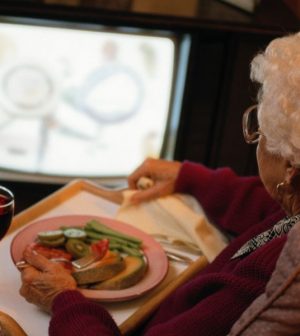- Could Your Grocery Store Meat Be Causing Recurring UTIs?
- Are You Making This Expensive Thermostat Error This Winter?
- Recognizing the Signs of Hypothyroidism
- 10 Strategies to Overcome Insomnia
- Could Artificial Sweeteners Be Aging the Brain Faster?
- Techniques for Soothing Your Nervous System
- Does the Water in Your House Smell Funny? Here’s Why
- Can a Daily Dose of Apple Cider Vinegar Actually Aid Weight Loss?
- 6 Health Beverages That Can Actually Spike Your Blood Sugar
- Treatment Options for Social Anxiety Disorder
Meals on Wheels Delivers an Extra Health Bonus for Seniors

Meals on Wheels might do more than deliver hot food to isolated seniors: New research suggests it can serve as an early warning system for declining health.
The study included Meals on Wheels drivers in Guernsey County in Ohio and San Diego County, who were trained to use a mobile app to alert care coordinators if the drivers had a concern or noticed a change in a senior’s condition.
The care coordinators then followed up with seniors to provide support and connect them with health and community services.
Over the 12-month study period, the drivers submitted 429 alerts for 189 clients. The most frequent alerts were for changes in health (56%), self-care or personal safety (12%) and mobility (11%).
Follow-ups on the alerts led to 132 referrals, with most for self-care (33%), health (17%) and care management services (17%), according to the researchers at West Health Institute at Brown University in Rhode Island and Meals on Wheels America.
The study was published recently in the Journal of the American Geriatrics Society.
West Health and Meals on Wheels America plan to expand the research program to as many as 30 Meals on Wheels sites across the United States, that include about 40,000 seniors.
“By collaborating with Meals on Wheels America, we’ve developed a safe, cost-effective and scalable program to preemptively identify and address concerns that too often result in deterioration of a senior’s medical condition or pose a major safety risk,” said Dr. Zia Agha, chief medical officer at West Health Institute.
“We’re excited learnings from this research program are now being implemented across the country within Meals on Wheels America’s expanded program that will positively impact as many seniors as possible,” Agha added in an institute news release.
In a special editor’s note, Dr. Michael Malone, section editor in models of geriatric care, quality of improvement and program dissemination with the Journal of the American Geriatrics Society, wrote, “As health care systems struggle to address the social determinants of health, this innovative Meals on Wheels model may provide part of the solution.”
More information
HealthinAging.org has more on seniors and home care.
Source: HealthDay
Copyright © 2026 HealthDay. All rights reserved.










